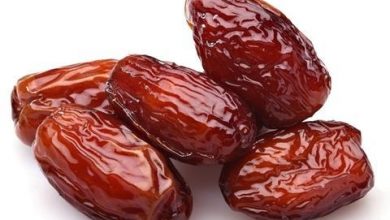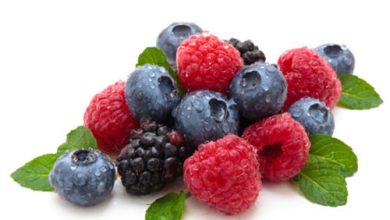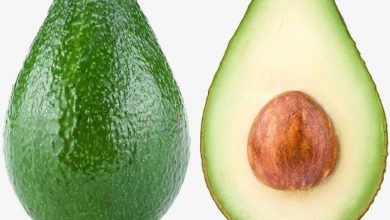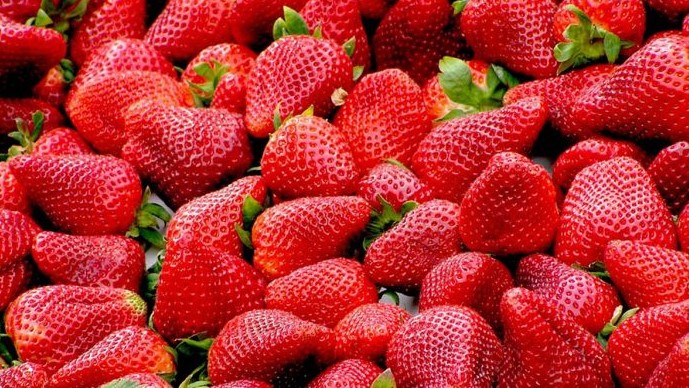
benefits of strawberries
the strawberry
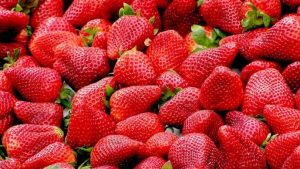

The nutritional guidelines recommend increasing the intake of fruits and vegetables to make the diet more healthy, because of its preventive and curative benefits in both obesity and related chronic diseases such as cardiovascular disease, diabetes, and cancer, because they contain dietary fiber, vitamins, minerals and many phytochemical compounds (phytochemicals). Phytochemicals are known as a large group of different chemical compounds from nutrients and are naturally present in plant foods and give them colors such as red in tomatoes and other sensory properties such as smell in garlic and do many functions in plants and it has capacities in the prevention of diseases in humans.
It is characterized by its many health benefits because it contains nutrients from vitamins, minerals and fatty acids, as well as dietary fiber and many polyphenolic phytochemicals such as flavonoids, phenolic acids, lignans, tannins, Strawberry has special attention as it is one of the most common fruits and tuna, especially because it is used in many food industries such as yoghurt, juices, jams, and gluten, in addition to fresh or separate foods. In recent years, some nutritional supplement with other fruits, vegetables, and herbs has been introduced. It has also been recognized as functional food for its health benefits beyond its nutrient content.
Contains the strawberries
Strawberry is one of the most fruit-containing essential nutrients, containing:
- Carotenoids, vitamin A, vitamin E, and vitamin K.
- It is characterized by its high content of vitamin C as it contains 60 mg / 100 g of fresh strawberries.
- It is also a good source of many other vitamins such as thiamin (B1), riboflavin (B2), niacin (B3) and pyridoxine (B6).
- Strawberries are also characterized by their high content of folate. Every 100 grams of fresh strawberries contains 24 micrograms of folate.
- In addition, strawberries are characterized by their manganese content.
- It is a good source of iodine, magnesium, copper, iron, and phosphorus.
- They also contain fructose sugar and dietary fiber, they represent all functions.
- To the traditional nutrients, strawberries contain phytochemical compounds that are directly highlighted:
- It’s anti-inflammatory properties.
- Antioxidant.
- And reduced to high blood lipids.
- Anti-bacterial, anti-allergic and high blood pressure.
- And resistance to tumor cell proliferation.
- In addition to the ability to neutralize the work of some enzymes and receptors to prevent many of the diseases induced by oxidation.
Flavonoids, specifical anthocyanins in the form of pelargonidin and cyanide derivatives, are the main types of phenol compounds found in strawberries, followed by ellagitannins (sanguiin-H-6), followed by the following flavonols (quercetin and kaempferol-3-malonylglucoside ), flavonols (catechins and procyanidins), phenolic acids (caffeic and hydroxybenzoic derivates)
The benefits of strawberries
Strawberry and resistance to inflammation
Inflammation occurs naturally when the immune system fights extraneous organisms and damage to the body from injuries, injuries, etc., but the constant stimulation of these processes or the irregularity of the immune system in relation to inflammation causes an active inflammatory state that plays a key role in chronic diseases such as heart disease, Bloody, Alzheimer’s, and type II diabetes.
A study of mice with diet-induced obesity showed an important role for strawberries in controlling blood sugar and regulating many aspects of the general inflammation in the body that are caused by obesity. Another study of mice has shown the role of strawberries in slowing the time of thrombosis Stimulated its formation by laser artery injury. It did so because of its effect on certain inflammatory products that stimulate atherosclerosis, and another study found that giving strawberries to experimental rats reduces the neurodegenerative damage to radiation exposure.
In humans, there are not a large number of studies that specialized in strawberries, but there are more studies that examine the effect of berries and their components on health. For example, a study was conducted to demonstrate the effect of phenol compounds in strawberries on the signs of inflammation and the post-meal insulin response. For this purpose, the test was performed on 26 overweight people. They were given a high carbohydrate and medium-fat meal to stimulate acute stress and stress Oxidative stress. A group of them were given 10 g of dried strawberry powder with the meal, while the other group was given a placebo. The results showed that strawberry intake had a direct effect in reducing the inflammatory response and reducing the amount of Solin separator after the meal. The results of these and other studies show the effect of strawberries in fighting the active inflammation that leads to many chronic diseases.
Strawberry and prevention of cardiovascular disease
Scientific evidence supports the role of consumption of fruits and vegetables in the prevention of many factors that increase the risk of cardiovascular diseases, such as obesity, hypertension, and type II diabetes, and many studies found an inverse relationship between eating fruits and vegetables and cardiovascular disease The role of strawberries in the prevention of cardiovascular disease can be summed up with three effects:
- Antioxidant.
- Anti-hypertension.
- Anti-atherosclerosis and the following studies illustrate these effects:
- Studies on strawberries suggest the role of flavonoids as antioxidants in maintaining cell membranes of oxidation that contributes to cardiovascular disease. In a study of 23 healthy volunteers, strawberries were given for one month, resulting in lowering total cholesterol and bad cholesterol (LDL) Triglycerides and a number of free compounds that raise the body’s oxidative stress, and reduce the intake of strawberries from many processes that contribute to cardiovascular disease, such as platelet aggregation and activation.
- In another study found that eating 500 g (test dose) of strawberries per day raised the level of antioxidants in the blood, especially the concentration of vitamin C, and found that strawberries improve the resistance of red blood cells to decomposition, and found that the anthocyanin extracted from strawberries and blueberries reduces Of high blood pressure. Another study found that anthocyanins (60% of which are extracted from strawberries and blueberries) reduce the risk of coronary artery disease and that consuming at least 3 servings per week of strawberry and blueberries reduces the risk of coronary artery disease.
Strawberry and metabolic syndrome
Metabolic syndrome is defined as having at least three of the following conditions: moderate obesity, insulin resistance, high blood pressure, high triglyceride, LDL cholesterol, and metabolic syndrome associated with high inflammation and oxidation indices Fat in the body. Many studies have shown the role of strawberries or anthocyanin extracts in reducing blood sugar in cases of obesity and diabetes. Strawberry extracts play a similar role to the digestive enzymes of carbohydrates and fats, which explains their ability to Control sugar and blood pressure and improve metabolic syndrome.
In an experiment with 27 people with metabolic syndrome, 50 g of dried strawberry powder (equivalent to 500 g fresh strawberries) was given daily, resulting in a reduction in total HDL, LDL, and malondialdehyde (a measure of oxidative stress) And the small bad cholesterol molecules, which improves the state of metabolic syndrome in obese adults, and other trials have found strawberry effect in lowering the rise in sugar and [[insulin resistance]] blood after meals.
It can be concluded from the above that strawberry has a positive effect in resistance to metabolic syndrome and in the prevention of type 2 diabetes, and may be useful to be addressed frequently by people who have the susceptibility or risk of infection.
Strawberry and its protective and therapeutic role in cancer
Strawberries are characterized by anti-cancer and anti-oxidant properties and protective effects of genes. These traits have been demonstrated in studies of many types of cancer cells in humans and in-vitro studies, in studies of in-vivo studies, But studies within the body looking at the effect of strawberries on cancer in the human body are still limited and need further studies to strengthen their results. Strawberries contain many polyphenols that have anti-cancer properties and also boost the work of certain chemical treatments.
The role of strawberries in cancer resistance is explained by their ability to remove the toxicity of certain carcinogens, remove active oxygen compounds, reduce oxidative damage to DNA, and reduce the proliferation of cancer cells by stimulating their death, stopping their dissociative cycles, As well as other mechanics.
In a study of the oral cancer-stimulating chemicals in experimental animals, it was found that strawberries reduce the formation of tumors and indicators of inflammation and the proliferation of cancer cells, and in a study of humans, the treatment of some flowering plants, including strawberries reduce the risk of cancer of the esophagus, head, and neck, A study of people with cancerous ulcers in the esophagus found that eating strawberries at 60 grams a day for 6 months could prevent the development of these cancers.
For colorectal cancer, a study was conducted on mice and found a positive effect of strawberry on many indicators of cancer development, while a large study was conducted on humans to demonstrate a simple strawberry relationship with a reduced risk of colon cancer. In the experimental mice, strawberry water extracts were found to inhibit the growth of tobacco-induced lung tumors, inhibit pulmonary emphysema, liver degeneration, weight loss, and gene dysfunction. Methanol strawberry extracts were able to stop breast cancer in modified test mice To stimulate breast cancer.
Strawberry and neurological diseases
A study conducted between 1980 and 2001 found a link between strawberry and blueberry consumption in high quantities with slow cognitive decline. Many studies found a role for strawberries in combating the decline of mental abilities as age increased. A substance found in strawberries The researchers found that it increases the secretion of serotonin and norepinephrine, which indicates the possibility of taking medicine as a natural antidepressant. One study found a role for the vesicles in fighting Huntington’s disease, which is characterized by decreased cognitive abilities as well as symptoms Psycho-motor that gets due to the death of brain cells, a disease that has no cure to this day, so strawberries can play a role in controlling the disease.
In addition to the benefits of strawberries mentioned, it can help strawberries in the treatment of some types of anemia because of its high content of folic acid, iron, and other nutrients, and is considered a diet low in calories and suitable for weight loss diet. In spite of the endless benefits of strawberries, some people are allergic to this fruit and all that it contains, such as some types of sweets or drinks, and should be avoided completely in these cases.
- Note: The subject of strawberry benefits is not a medical reference, please see your doctor.
References
Basu A. et al, “Strawberry as A Functional Food: An Evidence-Based Review”, Critical Reviews in Food Science and Nutrition, Issue 52, Page 790-806. Edited.
Giampieri F. et al, “Strawberry as a Health Promoter: An Evidence-Based Review”, Food and Function, Issue 6, Page 1386-1398. Edited.

